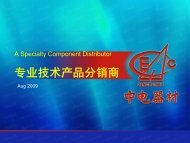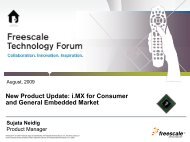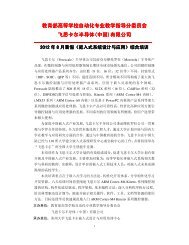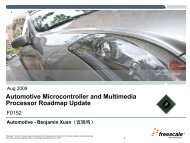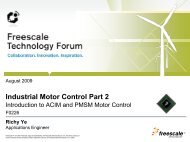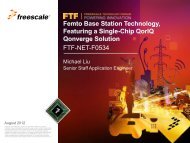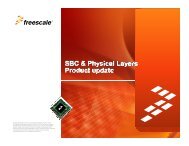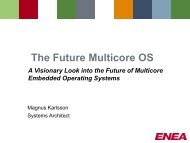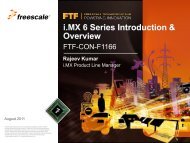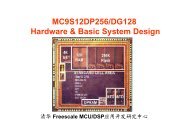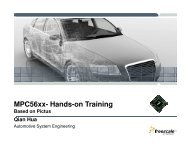Security
Security
Security
Create successful ePaper yourself
Turn your PDF publications into a flip-book with our unique Google optimized e-Paper software.
• Many automotive security applications are based on cryptographic<br />
algorithms that utilize security keys.<br />
• Today these security keys are typically encoded and in public Flash on<br />
chip. By being publically accessible, the keys are at risk to SW attack.<br />
• The CSE stores the keys in a secure Flash array that is only accessible<br />
by the CSE module.<br />
• The CSE additionally provides cryptographic algorithms (AES-128) and<br />
a secure boot up feature that allows for the public Flash to be<br />
authenticated.<br />
• The CSE module is based on the Secure Hardware Extention (SHE)<br />
spec.<br />
• FSL is the first to have silicon publically available that supports the SHE<br />
spec.<br />
TM<br />
10<br />
Crypto Service Engine (CSE)<br />
RNG<br />
Key<br />
NVM<br />
AES-128<br />
RAM<br />
CODE & KEY<br />
ROM<br />
Freescale, the Freescale logo, AltiVec, C-5, CodeTEST, CodeWarrior, ColdFire, C-Ware, the Energy Efficient Solutions logo, mobileGT, PowerQUICC, QorIQ, StarCore<br />
and Symphony are trademarks of Freescale Semiconductor, Inc., Reg. U.S. Pat. & Tm. Off. BeeKit, BeeStack, ColdFire+, CoreNet, Flexis, Kinetis, MXC, Platform in a<br />
Package, Processor Expert, QorIQ Qonverge, Qorivva, QUICC Engine, SMARTMOS, TurboLink, VortiQa and Xtrinsic are trademarks of Freescale Semiconductor, Inc.<br />
All other product or service names are the property of their respective owners. © 2011 Freescale Semiconductor, Inc.



